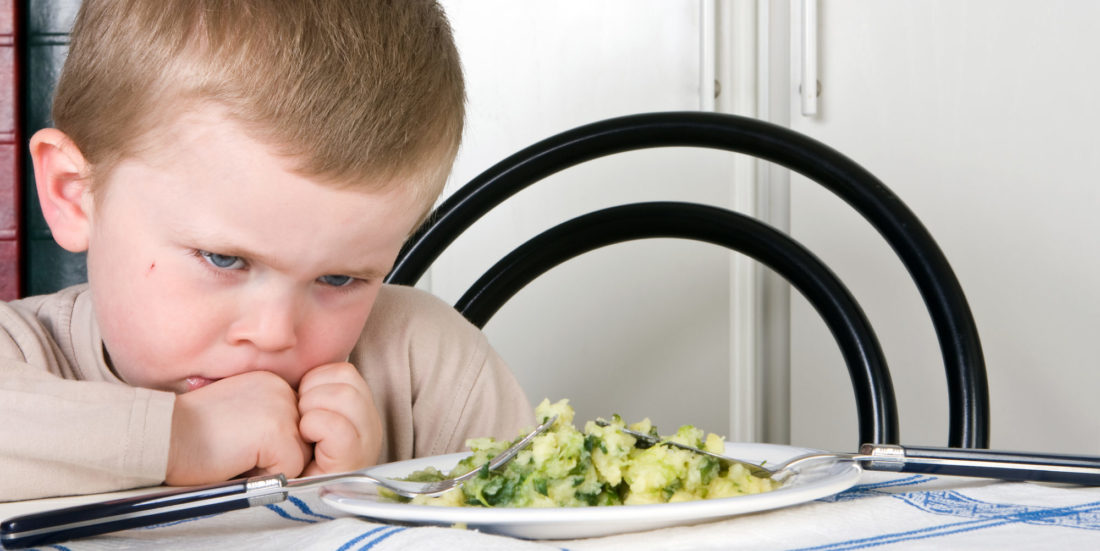Advice for parents who struggle with picky eaters
Children have to taste a food at least ten times before knowing whether they like it or not. Pickiness is hereditary, says an NTNU professor. She has nine tips for parents with picky eaters.
No to carrots, broccoli, cauliflower – and especially fish. Yuck! Is your little man sitting and picking at the beautiful meal you just made and claiming not to like any of it?
Does this sound familiar? Is it frustrating?
Relax. You aren’t alone in having children who are picky eaters.
A new study from NTNU shows that one in four kindergarten children has such quirky food preferences that researchers classify them as picky eaters. It actually takes some doing to be given the “picky” designation. Some children grow out of it, others gradually broaden their food palate, and for some children, their meagre food repertoire becomes a hindrance that limits their social activities, such as visiting friends or attending birthday parties.
The reason is simple: imagine having to eat something you don’t like? Dread and horror! Then it’s just safer to stay home.
Nine good tips on what to do about it
Silje Steinsbekk, a professor of psychology at NTNU, offers the tips that follow. She studies children’s eating habits and was part of a study on picky eaters
published in the International Journal of Behavioral Nutrition and Physical Activity.
The study is based on the Tidlig trygg i Trondheim project (The Early Secure Study) in Trondheim, where researchers have followed nearly a thousand children and their parents for ten years from the age of four years on. Through interviews, questionnaires and observations, they gathered information that is being used to investigate what promotes healthy development in children and adolescents.
1. The most important tip first: children should never be forced to eat, but strong encouragement to taste is often necessary.
“It’s okay for children to spit out the food they try and they’re allowed to get mad or sad, but they have to take a taste,” says Steinsbekk.
- Children have to taste the same dish at least ten to fifteen times before it’s possible to know whether they like it or not.
“Studies show that trying foods ten to fifteen times is necessary before you can tell if you like something or not. Once doesn’t do the trick. The older the child the more times they’ll need to try a food. In other words, it makes sense to let children try a lot of different foods lots of times from a young age. Exposure works.”
3. Pickiness is hereditary.
“Using twin studies, researchers have found that genes explain up to 70 per cent of picky eating. Parents who are or have been picky eaters themselves are much more likely to have picky children.
“Parents should nevertheless try to help the child like a larger variety of foods, but it is important to accept that children are also different when it comes to their pickiness. This is the case with obesity in children as well. Some are more vulnerable to developing obesity, but then it is all the more important for the child to develop good eating and activity habits.”
4. Yes, parents can influence picky eating.
“Observant and empathetic parents are good parents. Dealing with picky eating habits is about being sensitive to the child’s signals and needs, and responding well to the signals given. We found that children with sensitive parents had an increased risk of more food pickiness over time. We don’t know why this is the case. These parents may find it harder to stand firm in the child’s discomfort at trying foods, and so may expose their children less to foods they say they don’t like.
“At the same time, it’s important to emphasize that we did not directly observe meal situations, but assessed parent sensitivity based on interactions with their child in a play setting. Future research should therefore investigate whether sensitive parents are also more sensitive in meal situations, and thus expose their children to food that is new to the child or that the child says they don’t like to a lesser degree.
“Children need both love and correction. An authoritative parenting style is the one that best promotes healthy development in children. That means a lot of warmth, but also structure and clear boundaries. We found that the children were less at risk of increased picky eating over time if the parents were good at creating a framework or structure. We don’t know what this is due to, but it may be that these parents are more systematic in exposing their child to new foods and food the child doesn’t like, which in turn reduces the risk of picky eating habits. We hope that future studies will investigate this.”
5. Yes, some children grow out of being picky eaters.
“The study shows that one in four children is picky when they are four years old. One in four is also picky when the children are six years old. Half of the picky eaters at age four are no longer picky by the time they’re six, while others only develop picky eating habits at age six.
“Many childhood conditions come and go, and we don’t want to turn a childhood phase into a pathology. Picky eating steadily declines with increasing age, but for some children picky eating leads to not wanting to visit friends or participate in social contexts where food can be a problem. That’s when it’s a good idea to do something about it.”
6. Play with your food, create curiosity!
“Nobody wins if you let food and meals become a battlefield. Be playful, curious and involve your child! If you let your child cut the salad or taste the food as you’re making it, it’s easier for children to form a positive relationship with food. Understandably, a lot of parents can despair if they have children who will only eat three food items. It’s tough, but don’t give up. Instead, decide on what the dinner menu will be, and let the child choose from those items.
“Rewarding children for tasting different foods can be a helpful tactic. The reward shouldn’t be food or candy, but perhaps a bike ride, a comic book or something else the child wants to do. You can also create a reward form, where the child can check off each time they taste a carrot, for example. They reap their reward every time they earn five to seven checks.”
7. Sensitive children are more susceptible.
“Children that are generally more sensitive to taste, smell, and touch also appear to be at increased risk of more picky over eating over time. The child’s temperament had no bearing on picky eating in our study.”
8. Make sure the child is hungry.
“Children and adults who are hungry tend to be more open to food that they’re normally not so fond of. Give the child some cauliflower, a carrot or a tomato while waiting for dinner.”
9. Be generous with yourself and the child.
“Parents may feel like they’re failing if they have children who are picky eaters.
“Be generous with what you consider normal, and remember that in many cases this too will pass. Overall, I’m interested in finding a practical approach to food and meals. A sense of well-being and togetherness should be at the forefront. It’s much more important for parents to be aware of the family interaction and the mood, than just how many vegetables the child needs to eat. Parents can easily create a negative cycle if they constantly complain about the child being so picky, which then just enhances the pickiness.
“If you have a busy day, you can wait until Saturday to explore and taste some different foods. It’s okay to occasionally not have the time or energy to do what you know works best. Good enough will do,” says Steinsbekk.
Source: Child and parent predictors of picky eating from preschool to school age.





